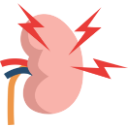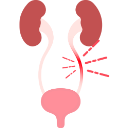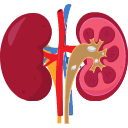Medical Programs
The KHTS physicians provide customized programs aimed to seek your health improvement and set a cohesive family program.
We care for you
Dr. Szewc’s mission is to help you focus on your new lifestyle. Our friendly staff is ready to listen and ensure to met your needs are met.
Custom Plans
Everybody’s case is different and there is no one-fit-all program. Dr. Szewc’s approach individualized your treatment reaching holistic approaches.
Proudly served
San Antonio’s families since 2002
Our priority at Kidney Hypertension Transplant Specialists is to provide comprehensive healthcare in the diagnosis, prevention, therapy, and treatment of kidney disease, hypertension, and anemia.
We strive to educate our patients and their families so that they may be integral contributors to their own well-being.
Providing kidney care goes beyond passion. It’s personal
How we can Help
The KHTS team provides the best service, and the team is really there to help you on your healing journey. We are here for you and your family!
Kidney Disease
Our nephrologists treat people with a variety of kidney diseases, including those who have lost function or who must rely on dialysis or a kidney transplant.

Hypertension
We assist in the management of therapy to help control hypertension prolonging the need for the onset of dialysis and reducing the risk for other diseases.

Vitamins & Supplements
Vitamins and minerals are substances your body needs to help carry out important functions, helping your body get energy from the foods you eat, help repair tissue, and help maintain life.

Anemia Management
Healthy kidneys produce the hormone erythropoietin (EPO). EPO tells your bone marrow to make red blood cells. If kidneys are damaged and cannot make enough red blood cells depriving the body of the oxygen it needs.
Having Trouble Finding the Right Medical Center for your Family?
You’re Not Alone. We are here to Help!
Kidney Hypertension Transplant Specialists is here for you.
We have three (3) locations in San Antonio, Texas and its surrounding areas for your convenience.
If this is an emergency, please call 911
About Dr. Robert Szewc
Nephrologist Specialist
Dr. Szewc has extensive training and experience in managing chronic kidney disease, hypertension, and anemia. His knowledge of dialysis and End-Stage Renal Disease is unsurpassed. He brings research experience in kidney disease treatment with both Hemodialysis and Peritoneal Dialysis.
Dr. Szewc was the founder of Kidney & Hypertension Specialists in 2002 and served as the medical director for two affiliated Dialysis Centers. Also, was the first provider in the San Antonio area for home dialysis.
Finding a Balance Can Be Hard, but having a Healthy Diet is the right step
Almost all vitamins and minerals come from the foods you eat. Your body cannot make these substances.
People with healthy kidneys who eat various foods from all the food groups (meats, grains, fruits, vegetables, and dairy products) can get enough vitamins and minerals. But if you have chronic kidney disease or are on dialysis, your diet may limit some food groups.
Dr. Szewc’s professional team and kidney dietitian can help you find out which vitamins and minerals you may need by looking at your health history and blood tests.
We have Developed Fun & Realistic Methods For a Balanced Nutrition
Your kidneys have many life-sustaining functions. They are involved in blood pressure control, maintaining electrolyte balance (sodium, potassium, phosphorous, calcium, etc.), removing excess fluid from your body, and clearing acids and medications from your blood.
The kidneys have important hormonal functions as well and are involved in the control of red blood cells and vitamin D production.
Our KHTS Patient Experience
Giving Power to your Health!
Patient Resources
We want you to have the best experience when visiting our Clinics. That is why being respectful with everybody’s time we have created this section where you can find easily all the resources, forms, documents, access to Patient Portal, and much more in one place.
Your feedback’s very important, please help us suit all your needs.
New patients forms
Diet and Nutrition
ONLINE RECIPES
Frequently Asked Questions
Educational resources from Kidney and Hypertension Specialists.
What is a Nephrologist?
A nephrologist is a medical doctor who specializes in kidney care and treating diseases of the kidneys. The term nephrologist comes from the Greek word “nephros”, which means kidney or renal, and “ologist” refers to someone who studies. Nephrologists are also called kidney doctors. Nephrologists are educated in internal medicine and then undergo more training to specialize in treating patients with kidney diseases. They commonly treat chronic kidney disease (CKD), polycystic kidney disease (PKD), acute renal failure, kidney stones, and high blood pressure and are educated on all aspects of kidney transplantation and dialysis.
What is Kidney Disease
Kidney diseases are disorders that affect the kidneys; the two organs that remove waste products, produce certain hormones and regulate the level of chemicals in the blood.
There are two types of kidney disease; Chronic Kidney Disease (CKD) and Acute Kidney Disease (AKD). CKD occurs when the kidneys stop working and never regain function. This is also referred to as End-Stage Renal Disease (ESRD). This condition may be caused by an underlying medical condition (ie. diabetes or hypertension) or heredity factors may play a part in CKD. Patients with CKD have two different types of treatment options: dialysis or transplant.
AKD is caused by an unexpected event that damages the kidney. This may be due to some type of poisoning, severe infection, or trauma. Dialysis may be implemented in these patients to manage the potential cause, but in most cases, kidney function is eventually restored.
What is an Angiogram?
An angiogram (also sometimes called an arteriogram) is a special x-ray examination of blood vessels. Usually, blood vessels do not show up on ordinary x-rays. However, injecting a special dye called contrast medium into your fistula/graft through a fine plastic tube called a catheter and taking x-rays immediately afterward can produce detailed images of your fistula/graft.
What does a Nephrologist do?
A nephrologist generally sees patients who are referred by their primary care physicians or general physicians for problems related to the kidneys, high blood pressure, or certain types of metabolic disorders. If someone feels they are having problems with their kidneys, they can seek out the care of a nephrologist. When a kidney doctor first meets with a patient, he or she will usually go over the patient’s medical history and do a complete physical.
A nephrologist will then do blood and urine tests to determine how well the patient’s kidneys are functioning. He or she may also order a kidney ultrasound. When necessary, a nephrologist may perform a kidney biopsy in order to better determine what is wrong with the kidneys. However, a nephrologist is not a surgeon and typically does not perform operations. Treatment of kidney cancer, prostate operations, and removal of kidney stones are usually handled by a different type of physician known as a urologist.
If a nephrologist finds that a patient’s kidneys are not functioning as they should, he or she will help diagnose the cause and prescribe a treatment plan. If a kidney doctor detects kidney disease, he or she will do tests to determine what stage of kidney disease the patient is in and plan the patient’s treatment. The nephrologist will usually refer the patient to a renal dietitian, renal social worker, and renal nurse who will help with the patient’s care. If the patient needs dialysis or a kidney transplant, his or her kidney doctor will discuss the different types of dialysis or refer the patient to a transplant center.
Nephrologists generally meet with dialysis patients several times per month and other types of kidney patients every one to three months. When a patient comes in for a check-up, the kidney doctor will evaluate the patient’s medical condition, address any new problems, check test results, make changes to the patient’s dialysis prescription if needed and refill or prescribe medications. During these visits, the nephrologist is also likely to adjust blood pressure medicines and may initiate or adjust therapy for a variety of other problems, such as diabetes, anemia, and high cholesterol.
Every nephrologist has received extensive training in general internal medicine, and many nephrologists will treat their patients for other things besides kidney problems. It’s important that patients tell their kidney doctors if they notice any changes in their health.
Also, depending on the dialysis center, a nephrologist may have a managerial role in how the center runs. If this is the case, he or she will set up the policies and procedures for how the center should run, how dialysis treatments should be done, and what roles the employees at the center will play in the process.
How Can I Treat Chronic Kidney Disease?
Treatment of CKD is extremely preventative. The goal is to slow down the disease as much as possible to extend your kidney health and function and avoid kidney failure. There are ways you can alter your lifestyle habits and diet to halt the progression of CKD. Here are some helpful tips to use if diagnosed with CKD:
- Manage your blood sugar closely, especially if you are diabetic.
- Keep close track of blood pressure and maintain a healthy blood pressure range.
- Control cholesterol intake.
- Follow a kidney-friendly diet consisting of low fat, low sodium, high protein, high potassium, and high phosphorous foods. Also, fluid intake needs to be monitored closely, as kidney disease prohibits the body from processing fluids effectively.
- Avoid certain medicines that are harsh on the kidneys.
- Avoid alcohol, tobacco, and other drugs.
- Maintain healthy body weight.
- Engage in an active lifestyle.
What is Anemia?
Anemia is a complication of kidney disease caused when the body does not produce enough healthy red blood cells. Red blood cells carry oxygen to organs and tissues throughout the body. Fewer red blood cells mean less oxygen. With less oxygen, organs and tissues cannot function well, leaving you to feel weak and tired.
Healthy kidneys produce the hormone erythropoietin (EPO). EPO tells your bone marrow to make red blood cells. If kidneys are damaged and cannot make enough EPO, your bone marrow will not produce enough red blood cells, depriving the body of its oxygen.
The symptoms of
- Weakness
- Tired
- Headaches
- Chest pain
- Paleness
- Dizziness
- Problems concentrating
- Difficulty breathing
Anemia begins in the early stages of Chronic Kidney Disease and gets progressively worse as kidney function declines. Anemia can decrease energy levels and even contribute to heart disease and increased hospitalizations. A simple blood test is possible to identify Anemia.
Kidney and Hypertension Specialists help manage Anemia resulting in a better quality of life.















